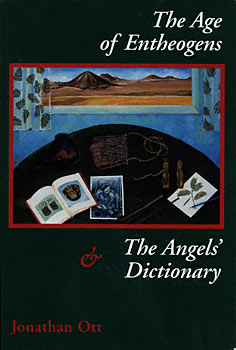from
Erowid Conference Report: Mind States Costa Rica by Lux, Erowid Staff Writer
v1 – Jul 18, 2007
sample from Jon Ott-
"The End of the Treasure in the Basement", by Jonathan Ott
Jonathan described himself as "not a prophet", but someone who has been interested in the question of energy and the petroleum-based political and economic infrastructure of the industrialized world since the 1970s. He's surprised that the infrastructure has held itself together as long as it has.
Most known organisms derive their energy from the sun, which was properly regarded by many religious cultures as the origin of life.
….
Since 1979 the amount of energy per capita has decreased, and more people have no access to energy and water every year. We're starting over the hill and soon it will be a cliff. This is important because energy equals life, in a literal and direct equation. What Hubbard pointed out was the disparity between the natural ecology of energy and the economic system of the world.
So we start looking to alternatives to oil, coal, natural gas, and wood. Take nuclear energy � it is highly efficient in generating electrical power, but it requires a huge investment of energy to operate. Nuclear power plants must have their own power plant to run, and it may be the case that nuclear power does not even generate net energy.
Fusion reactors are too little, too late. A best-case scenario is production of fusion power in 2050, and that's way too late.
There are currently four countries that have not yet reached their peak. Jonathan predicts that within 30 years the wheels will come off the global economy. Perhaps as soon as 20, but definitely by 30.
Jonathan's response to this situation has been to create a self-sufficient solar and water power supply that powers his lights, a short-range electric car, and his basic needs. He's beginning to generate all of his own food in a sustainable little farm as well, and his hope is to live to see the day when everything comes unglued so he can see what happens.
http://erowid.org/general/conferences/conference_mindstates7.shtml
Ott is one of my favourite writers and theoreticians.
Author of (Books)
Ometochtzin: Las Muertes de Dos Conejo (2001)
Just Say Blow. Coca and Cocaine: A Scientific Blowjob (2001)
Shamanic Snuffs or Entheogenic Errhines (2001)
Pharmacophilia: The Natural Paradise (1997)

http://www.erowid.org/library/books/images/age_of_entheogens.jpg
This is a mind-blowing book, especially the Angel's Dictionary!
Age of Entheogens & the Angels' Dictionary (1995)
Ayahuasca Analogues: Pangaean Entheogens (1995)
Pharmacotheon: Entheogenic drugs, their plant sources and history (1993)
Persephone's Quest: Entheogens and the Origins of Religion (1986)
The Cacahuatl Eater: Ruminations of an Unabashed Chocolate Addict (1985)
Teonanacatl: Hallucinogenic Mushrooms of North America (Co-edited by J. Bigwood, 1978)
Hallucinogenic Plants of North America (1976)
more on Ott here
http://www.erowid.org/culture/characters/ott_jonathan/ott_jonathan.shtml
